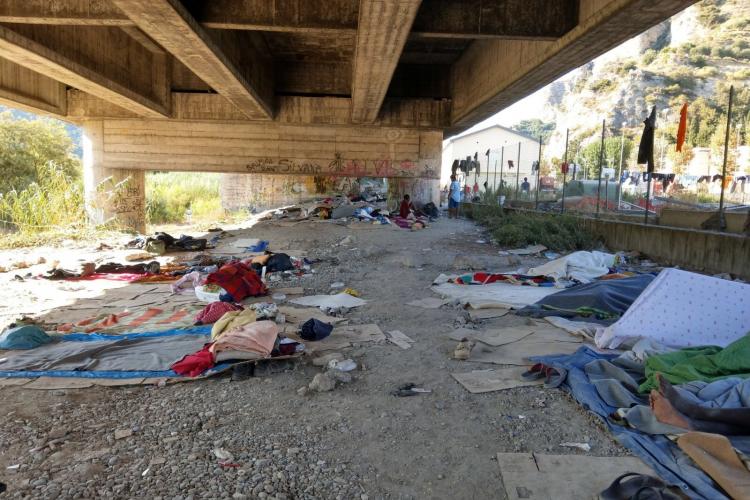Post by Marta Welander. Marta is a doctoral researcher and visiting lecturer in the Department of Politics and International Relations at the University of Westminster and executive director of Refugee Rights Europe. In this blog, she discusses the situation for unaccompanied minors in northern France and at the French-Italian border, arguing for an expanded legal route to safety in the UK.
This October, it will be three years since the opening of the so-called ‘Dubs scheme’, under section 67 of the UK Immigration Act 2016, giving vulnerable unaccompanied children in Europe a safe and legal route to the UK. The Government committed to transferring only 480 vulnerable children to safety. But three years on, the Government has still not filled the places on the scheme. Children have been left in limbo, waiting to be transferred to safety, unable to rebuild their lives.
These vulnerable children are left in harmful environments, without access to the care and support they so desperately need. First-hand accounts from the ground in Calais and Dunkirk highlight a case of extreme neglect and failure to uphold a duty of care towards unaccompanied minors circulating in the area. Due to repeated evictions, demolitions and harassment performed by police officers in the area, there appears to be a complete break-down of trust between minors and the French authorities, preventing most minors from accessing help through existing child protection provisions.
This sustained heavy-handed approach by the police, coupled with detrimental living conditions, is likely to contribute to a further degradation of minors’ physical and mental well-being; many of whom have already gone through traumatising experiences throughout their journeys and in their countries of origin. The seeming lack of alternatives leads many children to taking matters into own hands. Finding themselves trapped between the sealed off British border and the heavy-handed approach of the French authorities, many risk the dangerous, and sometimes deadly, journey to the UK via lorries, vessels and other UK bound vehicles. Others resort to smugglers for their onward journey, and it is beyond any doubt that these children are at extreme risk of exploitation and trafficking.
Meanwhile, at the French-Italian border, a bottle-neck scenario has been created following the de facto suspension of the Schengen agreement, with incredibly dire living conditions for minors who find themselves trapped in Ventimiglia and other towns along the border. The detrimental living conditions are likely to compound mental and physical health concerns already rampant among unaccompanied minors who may have faced torture and violence in Libya and at other stages of their journey.
In addition, the widely reported illegal practice of pushing minors back to Italy by French border police (In line with Articles 6, 7 and 8 of the 2013/32/EU Directive and Articles 24 and 25 of the 2013/33/EU Directive), coupled with the absence of meaningful communication and guidance, means that many unaccompanied minors resort to increasingly life-threatening journeys via motorway tunnels, train tracks and mountain passes. Such risky border crossings have reportedly led to many instances of serious injuries, mountain falls, hypothermia, frostbite and death. In the absence of adequate safeguarding mechanisms, many others will fall into the hands of smugglers or traffickers in order to cross, putting them at extreme risk of exploitation and abuse.
Expanded safe and legal passage-ways to the UK, including under the Dubs scheme, could have given many of these vulnerable unaccompanied minors a route to safety in the UK, allowing them to rebuild their lives. However, rather than filling the 480 spaces in a timely manner, children have been left in limbo, waiting to be transferred to safety.

In light of these wide-ranging risks facing unaccompanied minors across Europe, arguably the UK Government ought to contribute towards their safeguarding by urgently allocating the remaining places under the Dubs amendment. Moreover, as part of its recently announced future resettlement scheme,, the UK Government would be in a good position to agree to fully funded, long term resettlement plans for displaced children in Europe. A different situation for unaccompanied minors in circulating across Europe can and must be possible, and now is the time for the UK Government to act to ensure that the rights and safety of children are upheld in Britain’s post-Brexit immigration policy framework.
Any comments about this post? Get in touch with us! Send us an email, or post a comment here or on Facebook. You can also tweet us.
__________
How to cite this blog post (Harvard style)
Welander, M. (2019) Three Years On, Unaccompanied Minors Still in Legal Limbo. Available at: https://www.law.ox.ac.uk/research-subject-groups/centre-criminology/centreborder-criminologies/blog/2019/09/three-years (Accessed [date])
Share:








